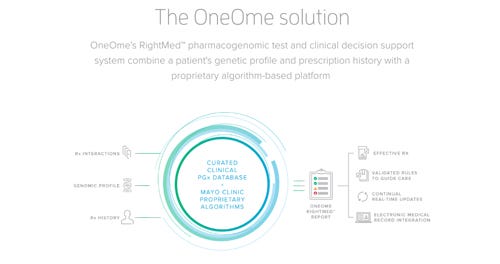Changing the Way Drugs Are Prescribed
July 22, 2016
OneOme (Minneapolis) provides patients with a pharmacogenomic test that then informs their health providers via an algorithm-based clinical decision support, helping the health providers to tailor prescriptions to exactly fit patients' needs. The decision support covers 340 medications for more than 20 medical indications. And it has a better chance of succeeding because it came out of a healthcare environment, co-developed and exclusively licensed from Mayo Clinic.
"It could fundamentally change the way drugs are prescribed and what is prescribed, and reducing adverse events will improve outcomes," says Frank Jaskulke, vice president of member services at the Medical Alley Association in Minnesota.
Geneticure, based just to the west of Minneapolis in Minnetonka, is also seeking to use genetics to inform prescribing. Geneticure boasts a CLIA-certified laboratory to provide genetic tests, the results of which health providers can use to create ideal hypertension drug therapies, versus trial and error prescribing.
"This technology significantly reduces the cost of care for chronic hypertension patients, it decreases the cost to the payer, it allows hospitals to care for more patients, and it increases population health. All this through a very fast and low cost solution to a very common illness," says Greg Groppoli, member services manager at the Medical Alley Association.
Continue >>
[Image courtesy of OneOme]
About the Author(s)
You May Also Like





